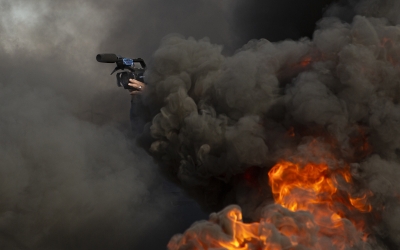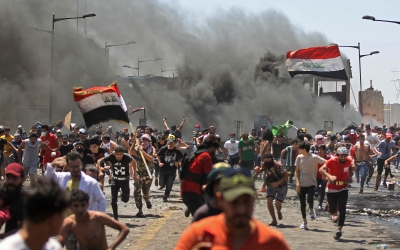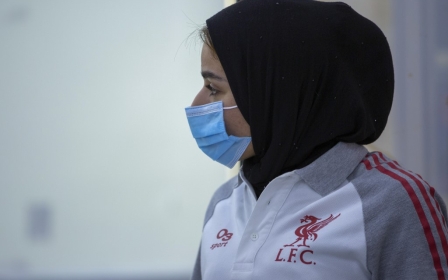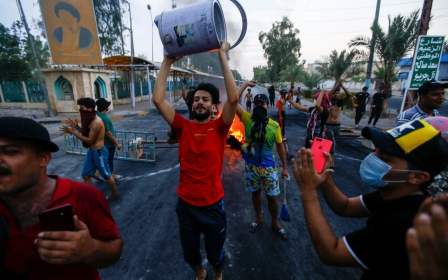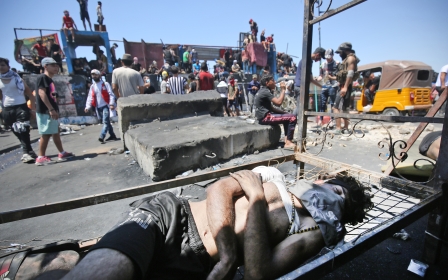Iraqi female journalists in Basra fear for safety following attacks on activists
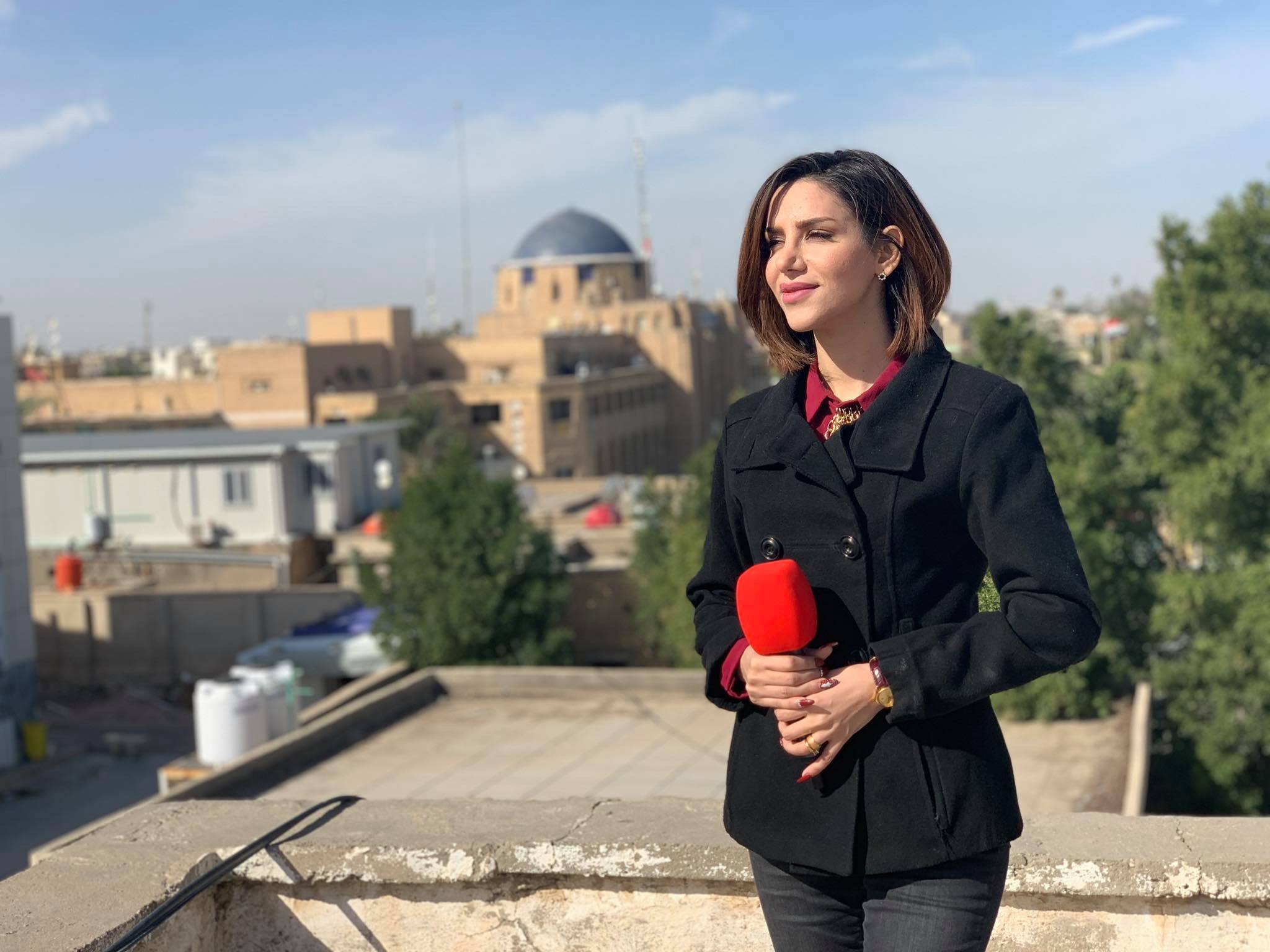
Female journalists in Basra are becoming increasingly concerned for their safety, following a recent string of attacks on female activists in the Iraqi city, Middle East Eye has learned.
Last week’s killing of 29-year-old Riham Yacoub, a prominent women's rights campaigner gunned down by unknown assailants on a motorcycle, prompted both outrage and concerns among those who dare speak out against the government and advocate for their rights.
Journalist Arwa Hazim al-Amiri, 26, said she decided to leave the southern city after the death of Yacoub, who was a personal friend.
“She [Yacoub] was a leading figure, a fun and disciplined person. Lots of Basra women were influenced by her character, and she had a big influence on the public opinion,” said Amiri, who had worked with Yacoub at the privately-owned Radio Al-Rasheed.
Amiri said she once proposed to Yacoub to flee Iraq for safety, but the latter replied: “For whom do I leave the country, or benefit a country other than my homeland?”
But for Amiri, leaving Basra was the right decision, especially after receiving threats from “unknown persons via fake social media accounts” because of her profession.
“Activists and journalists are facing the same threats. Anyone who tries to criticise armed groups will be an easy target for them, particularly in Basra city as it is a hub for the Iran-backed militias,” she told MEE.
Yacoub was an outspoken critic of the Iran-backed militias whose power and influence Prime Minister Mustafa al-Kadhimi has been trying to rein in since taking office in May.
The attack on her was the third on activists in the southern city in a week. Tahseen Oussama, 30, was gunned down on 14 August and four others were shot at while together in a car last Monday.
Yacoub's killing cast a pall over Kadhimi's recent trip to the United States. The violence reignited anti-government protests in Basra and the US State Department publicly urged Kadhimi to hold the militias accountable, just two days after he sacked the Basra police and national security chiefs and formed a special committee to investigate the attacks.
The border crossings in the south and east of Iraq are under the complete control of Shia factions linked to Iran. And Amiri suspects militia groups are responsible for the assaults on activists.
“Iranian proxies in Basra timed the assassination of Riham and other activists during Kadhimi's first visit to Washington DC. It is just a normal reaction by the Shia-Iran-backed militias,” she said.
Since taking office in May, Kadhimi has pledged to hunt down assailants of activists and keep the armed groups in check. But there have been few developments since.
Suppressing women's voices
While the killing of opposition figures has been taking place in Iraq for years, the recent spike in attacks on women activists and journalists was because of the rising prominence of female voices, said Sanar Hassan.
The Baghdad-based journalist said the militias know that women's freedom threatens their existence, and they killed Yacoub not because she was a civil activist who called for freedom and security for her city, but because she was a “successful and free woman”.
'The militias in Basra do not want any semblance of development and freedom in this rich city'
- Sanar Hassan, journalist
“The militias in Basra do not want any semblance of development and freedom in this rich city," Hassan said.
"They work for Iran and do not want to lose out on Iraq’s economic capital and wealth, neither do they want to lose the path (this arrangement) provides for their own lucrative incomes".
Months ago, Hassan translated an article for an Iraqi local news agency, which revealed the Popular Mobilisation Forces’ involvement in the drug trade in Basra.
Soon afterwards, she began receiving threats from "unknown individuals with fake accounts”. The agency’s director was also threatened not to publish any articles that might ‘offend’ the militias.
“There is no such thing as freedom of expression in Iraq.
“When you work as a journalist, you have two options: either be brave and reveal the facts that might put you and your family in danger; or keep silent and collude with the militias, and be part of this propaganda and say what they want to hear, not what you want to write or say,” said the 26-year-old.
Hassan said she is still striving to achieve dreams that will make her proud, but the fear of getting killed is very real.
“The one thing I am afraid of is to be killed by a criminal who does not even know why he killed me, just because his leader or his militia gave him the order,” she said.
However, she encouraged campaigners to continue expressing themselves freely.
“If everyone is silent now, the situation will get worse and we will all be killed, while these militias walk free without any trial.”
Instilling fear
Lodia Raymond survived an assassination attempt in the same week that Yacoub was killed. Gunmen fired at her from a car while she was walking near her house.
Raymond is one of the most prominent activists in the oil-rich city of Basra. She has been taking to the streets since 2018, demanding fundamental rights that Iraqis have been deprived of - including jobs, electricity, fresh water, healthcare and public service.
“Thanks to God who protected me, helped me survive, so I can continue demanding the rights of my city’s people. For many years we’ve been fighting to get rid of the bloody militias who killed us for no reason, just because we want a home,” she told MEE.
Nationwide anti-government protests erupted in October, which saw more than 500 demonstrators killed at the hands of security forces, according to an adviser to Kadhimi.
Like many other Basra activists, Raymond said she had received threats from unknown individuals telling her not to attend demonstrations in Baghdad’s Tahrir Square, the epicentre of the protest movement.
“If you continue to attend the movement, you will be next,” Raymond was told.
For now, following the death of her friend Yacoub, Raymond said she was staying home to avoid being a target for Basra’s armed groups.
The threats may have temporarily silenced some women’s voices, but one 16-year-old activist from Basra said she would not stop protesting until the movement’s demands were met.
“My parents are proud (of me) for protesting against corruption and those who have stolen the country since 2003,” said the teenager who asked to stay anonymous.
“All we want is a home for all Iraqis regardless of their backgrounds. (The militias) will never frighten me, and I will continue to protest. Better die with honour than live with shame,” she said.
Middle East Eye propose une couverture et une analyse indépendantes et incomparables du Moyen-Orient, de l’Afrique du Nord et d’autres régions du monde. Pour en savoir plus sur la reprise de ce contenu et les frais qui s’appliquent, veuillez remplir ce formulaire [en anglais]. Pour en savoir plus sur MEE, cliquez ici [en anglais].


